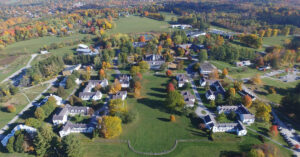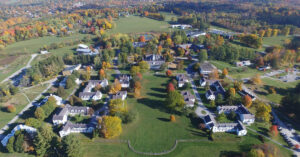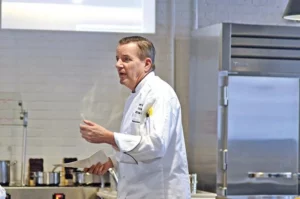This is a two-segment piece covering President Walker’s latest events aimed to connect with students, with Thomas Finegar and Lauren Yanase contributing.
Brunch With the President
Laura Walker, President of Bennington College, is nearing the end of her first year in the role. Her accomplishments have primarily been staff-facing, and her goal to bring in a record-size freshman class has been achieved. Now that those ambitions are underway, she has shifted her attention to the current student body in an effort to become a more familiar face on campus.
Walker has hosted two Brunch with the President events and one Walk with Walker event, sat in on multiple plan committee meetings, and has begun to attend student life events such as the Nature Walk. Though none of the student representation groups have had a strong response to these events, they are widely known about and attendance has reportedly been sufficient.
While attending the second Brunch with the President event, the point of these intentional spaces became very clear. Walker continues to open up space for students to voice any issues that they currently have with how the college is running. In the interest of privacy, members of the brunch declined to go on the record with any of the conversations that were had, except for one question directed to Walker: “What has been the most difficult part of your first year?” to which her response was “Not see[ing] students.” This only further solidifies the purpose of these events.
With a growing amount of student-facing events being hosted by the President’s Office, it can be expected that an increasing number of students will have the opportunity to voice their concerns about the college. One interviewed student stated that they “don’t think the whole student body would attend the brunches.” While it seems–based on the attendance of the second brunch–that this is true, there is optimism in the student body about further student-facing events. The interviewed student went on to say “In addition to those brunches, there should be other opportunities for students to meet with Laura.”
Another student who attended one of the brunch events stated “I think that the issues I brought up will be addressed, at least it seemed like Laura cared about hearing them.” We have yet to see a direct action being taken, in a public manner, in response to the conversations being had but expect that many of these actions will begin over the summer. In any case, new college initiatives for the benefit of the student body, or the lack thereof, will continue to be reported on and it seems clear that Walker will continue to create opportunities for students to voice their opinions.
By Thomas Finegar
Student Town Hall
On Thursday, May 13, College President Laura Walker held a sparsely attended Town Hall meeting for the student body covering a wide range of topics from student-led initiatives to concerns over the registration process.
President Walker introduced Marta Esquilin and Dr. Alfredo Medina to the group of fewer than 20 students in the Tishman Lecture Hall, the Associate Dean of the Honors Living-Learning Community at Rutgers University in Newark and the recently appointed Vice President for Diversity, Equity and Inclusion (DEI) and College Diversity Officer, respectively. Ms. Esquilin has been advising the President’s Working Group in her capacity as an independent consultant on “Diversity & Social Justice Training for Organizations and Educational Institutions,” and would be serving as a moderator for the meeting. She began with a virtual poll on attendees’ current mood and areas of interest for the conversation. Attendees could answer the poll and submit their questions that she would then cull and in turn, direct to President Walker.
Following Ms. Esquilin’s introduction, Dr. Alfredo Medina, screened a recorded greeting to the attendees. Dr. Medina expressed his enthusiasm and optimism in his new role, and cited his candidate interviews with students as the “clincher” in his decision to join the College’s Administration team.
President Walker began her remarks by citing the “spirit of transparency” in which the town hall would be held. Throughout the event, she endeavored to do just that; preemptively addressing campus-wide concerns, sometimes veering off topic and speaking freely. She meticulously worked her way through the talking points that she had shared at the top of the session: starting with the selection of the controversial 2021 commencement speaker, Darren Walker, President of the Ford Foundation (to be referred to as Mr. Walker, to avoid confusion with College President Laura Walker). President Walker acknowledged the controversy around the selection of Mr. Walker specifically, but reiterated that she “strongly stood” by the choice. Darren Walker’s invitation as commencement speaker, Walker reminded attendees, predated her own tenure as College President, when he was asked to give the commencement for the Bennington class of 2020. When the COVID-19 pandemic necessitated the cancellation of an in-person celebration and commencement, Mr. Walker was then slated as the 2021 commencement speaker.
Anticipating the slough of questions and concern about Darren Walker, President Walker, growing emotional at times, staunchly defended Mr. Walker as this year’s commencement speaker, speaking to his personal connection to the College as the longtime partner of David Beitzel, a Bennington alumni who passed away in 2019: “Darren loved Bennington because David loved Bennington.” The late Mr. Beitzel, aside from graduating from Bennington College with an MFA in Art in 1983, served on the College’s Board of Trustees for several years, and was instrumental in establishing the Tillman lecture series in the 1990s.
Almost a third of the comments and questions on the anonymous Q&A platform were directly about Mr. Walker and his role as President of the Ford Foundation, and his past statements on mass incarceration. One anonymous user highlighted their concerns about the one hundred Ford Foundation Fellows who wrote a protest letter expressing concerns with Mr. Walker’s statement in 2019, asking, “How does [that statement] align with the values of Bennington?” Others were concerned about Mr. Walker’s connection to New York Governor Andrew Cuomo, having served on the embattled Governor’s Reimagine New York Commission.
A point President Walker conceded to unprompted, however, was the previous selection process of commencement speakers, which she criticized as being isolated from student input, and vowed to integrate student involvement in future.
Overall, the president was emphatic in addressing the insufficient communication channels from the top-down between administration to students and every group therein. She took pains to reinforce her administration’s commitment to student involvement, and invited members of various task forces to speak on their groups’ work and progress in the respective areas.
Jaime Babic, Registrar and Director of Enrollment Services, was invited as a member of the Registration Task Force to respond to students’ concern over this fall’s highly unusual and grueling registration process. Ms. Babic reported the results of a campus-wide survey on the registration process last winter, indicating a 25% completion rate among all students, and that 80% of submitted surveys indicated satisfaction with the process.
Ms. Babic also worked to assure attendees about the impact of the historically large incoming class of 2025. With an estimated 270 students in the new class, there has been widespread concern and suspicion that an oversized rising freshmen group is limiting seats for the rest of the school. Ms. Babic firmly rejected that, stating that the registration process was proportioned to give all undergraduate students 18 credits, with considerations for year and academic interest. She also promised that with the expected hires to faculty, new courses would be added for registration over summer.
The Shared Governance, Campus Safety, and President’s Working Group Task Forces all took their chance to express frustration and exhaustion with the unique challenges a school year amidst a pandemic might bring. Most of the work for the groups, it seemed, was holding consistent meetings to ensure that next year initiatives and actionable items can be picked up.
The Shared Governance Task Force representatives spoke to the difficulty of beginning their work in the middle of the term amidst a pandemic, but told attendees promising news about reconstructing their work in the pretext of tutorial. The credits offered, organizers said, might incentivize more student participation in reorganizing the governing structure to include student voice.
The Campus Safety Task Force did not address the recent changes to the department (including longtime Director, Ken Collamore, stepping down).
The reception to the student representatives was chilly: on the online Q&A, anonymous users aired grievances about a social class imposed by the groups: “Task forces [are] not shared governance[,] you are creating a hierarchy among students and do not speak for all of us. Shared governance should involve all students.” This hostile tone was similarly reflected in the in-person discourse along with the online (anonymous) forum.
Ms. Esquilin and President Walker worked quickly to answer as many questions before the hour was out, including commenting on the BDS (Boycott Divest Sanction) Israel movement on campus and the situation in Gaza broadly. At the end of the town hall meeting, it was evident that tensions remained high, despite President Walker’s best efforts to put controversies to bed. Frustration poured out onto social media to bemoan the absence of certain topics or certain people.
Whether it was finals fatigue, poor advertisement, or plain lack of interest, the Student Town Hall on May 13 saw a depressing student-body turnout and a host of consequential topics. President Walker has made a clear commitment to administration transparency with students, but it seems the College and its communication channels have some catching up to do.
By Lauren Yanase

Lauren Yanase is a first-year student with a passion for strong coffee and environmental education. When not playing in the woods, Lauren enjoys studying the interplay between history and storytelling through a multi-medium platform. Her award-winning documentary, Shikata Ga Nai: An Inconvenient American, has been shown at cultural and historical events, awareness seminars, and in classrooms across the West Coast.





Be First to Comment